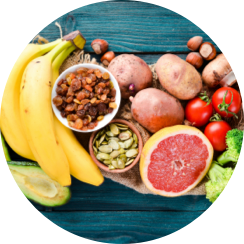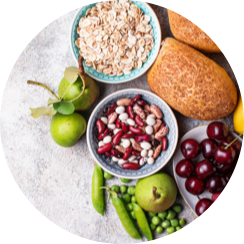
VITAMIN D
What is vitamin D?
Vitamin D is a unique nutrient because it can be obtained from food, but the body can also make vitamin D in the skin with the help of sun exposure. During winter months, production of vitamin D in the body can be lower due to less sunshine and less time spent outside.
What are its key functions?
Vitamin D is essential for promoting calcium absorption in the digestive system and maintaining adequate blood levels of calcium and phosphorus, which allows for normal bone mineralization. Without sufficient vitamin D, bones can become thin, brittle, or misshapen. Also, vitamin D is a fat‐soluble vitamin that helps to activate immune cells and properly regulate their function in the body.
What are some good sources?
Good sources of vitamin D include fortified milk, tuna, salmon, and egg yolk. Another good option is PediaSure Grow & Gain Shakes, which contain 30% of the Daily Value (DV) per bottle of vitamin D.

POTASSIUM
What is potassium?
Some foods high in potassium include vegetables and fruits. Water balance is important, as it moves body fluids necessary for circulating blood throughout the body, helping kidneys remove waste from the body, and assisting nerve transactions that move muscles and cells.
What are its key functions?
Potassium is involved in multiple key functions in the body, including nerve transmission, muscle contraction, and the movement of fluids in the heart and kidneys using blood vessels.
What are some good sources?
The main source of potassium in the human diet is vegetables. That may explain why many children are not getting enough potassium. Bananas, citrus fruits, and other vine fruits like grapes and blackberries are also good sources. Learn more about MyPlate for kids and proper vegetable servings or check out PediaSure Grow & Gain Shakes, another good option to help achieve the recommended Daily Value (DV) of potassium.

CALCIUM
What is calcium?
Calcium is the most abundant mineral in the body, and it is essential to building strong bones, teeth, and muscle. Yet some kids don’t get all the calcium their bodies need.
What are its key functions?
About 99% of the body’s calcium is found in bones and teeth, where it is essential for formation and maintenance of strong bones and teeth. The remaining 1% of calcium is found in blood, muscles, and other tissues and has important roles in blood clotting, muscle function, nerve transmission, and blood pressure.
What are some good sources?
Good sources of calcium include dairy foods (like milk, cheese, and yogurt), dark leafy greens, edamame, and sardines. PediaSure Grow & Gain Shakes have 25% of the Daily Value (DV) of calcium per bottle and are suitable for lactose intolerance!

FIBER
What is fiber?
Dietary fiber is the edible part of plants or other carbohydrates that is resistant to digestion and absorption in the small intestine. Complete or partial digestion of dietary fiber occurs in the large intestine.
What are its key functions?
Fiber plays an important role in supporting a healthy digestive system, and it helps keep the body's system clean and running smoothly. Plus, when combined with ample fluid intake, fiber helps move food through the digestive system and helps reduce the risk of constipation and other digestive disorders.
What are some good sources?
- Grains: Whole-grain breads and cereals, oat bran, brown rice, and barley
- Fruit: Apples, oranges, bananas, berries, prunes, and pears
- Vegetables: Green peas, artichokes, baked potatoes with skin, and legumes (e.g., dried beans, split peas, and lentils)
- PediaSure Grow & Gain with Fiber and PediaSure SideKicks Shakes have 3 grams of fiber per serving.
* Top 4 nutrients of concern in American diets as reported by Dietary Guidelines for Americans 2015-2020 (calcium, vitamin D, fiber, potassium).




